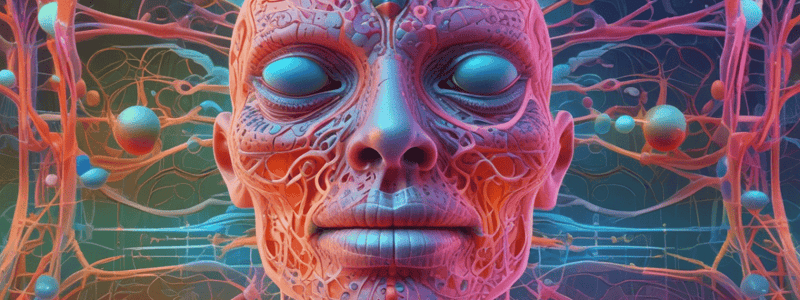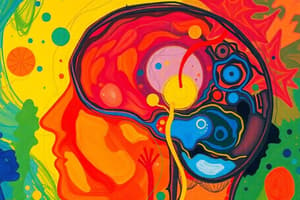Podcast
Questions and Answers
Which of the following mechanisms is NOT involved in regulating body temperature?
Which of the following mechanisms is NOT involved in regulating body temperature?
- Vasomotor control
- Photosynthesis (correct)
- Sweating
- Shivering
When core body temperature falls below the optimal range, the hypothalamus initiates which response?
When core body temperature falls below the optimal range, the hypothalamus initiates which response?
- Vasodilation to increase heat loss
- Sweating to promote evaporative cooling
- Increased thyroid hormone production
- Vasoconstriction to conserve heat (correct)
What is the primary role of sweat glands in regulating body temperature?
What is the primary role of sweat glands in regulating body temperature?
- Producing sweat to increase heat loss through evaporation (correct)
- Initiating shivering to generate heat
- Triggering vasodilation to increase blood flow
- Releasing hormones to stimulate thermogenesis
Which of the following hormones is NOT involved in regulating body temperature?
Which of the following hormones is NOT involved in regulating body temperature?
What is the primary function of regulating blood glucose levels?
What is the primary function of regulating blood glucose levels?
Which of the following best describes a feedback mechanism in the context of homeostasis?
Which of the following best describes a feedback mechanism in the context of homeostasis?
What is the primary function of insulin in regulating blood glucose levels?
What is the primary function of insulin in regulating blood glucose levels?
Which hormone is released when blood glucose levels drop below optimal concentrations?
Which hormone is released when blood glucose levels drop below optimal concentrations?
What is the role of a negative feedback mechanism in maintaining homeostasis?
What is the role of a negative feedback mechanism in maintaining homeostasis?
Which of the following is NOT a component of the homeostatic process?
Which of the following is NOT a component of the homeostatic process?
What is the primary role of hormones in the endocrine system?
What is the primary role of hormones in the endocrine system?
Which of the following statements about carbohydrate digestion is correct?
Which of the following statements about carbohydrate digestion is correct?
Flashcards are hidden until you start studying
Study Notes
Homeostasis: Regulation of Body Temperature, Blood Sugar, Hormonal Balance, and Feedback Mechanisms
Overview
Homeostasis refers to the maintenance of stable internal conditions necessary for life by living organisms. This concept includes various physiological processes aimed at balancing critical parameters like blood sugar levels, body temperature, and hormonal balance across several organ systems. Understanding homeostasis helps explain how complex organisms maintain vitality despite fluctuations in environmental conditions.
Regulation of Body Temperature
Body temperature is maintained within a narrow range using various physiological mechanisms. These include vasomotor control, sweating, shivering, and nonshivering thermogenesis. For instance, when core temperature falls below set limits, the hypothalamus activates vasoconstriction, shunting blood away from the extremities toward the core and conserving heat. Conversely, when the optimal temperature is exceeded, hormones like thyroid hormones and adrenaline trigger vasodilation, increasing heat loss to the environment. Sweat glands play another crucial role in temperature modulation by producing sweat, which cools the skin through evaporative cooling when ambient temperatures are high.
Blood Sugar Regulation
Regulating blood glucose levels is essential for proper functioning and survival of cells. After ingesting carbohydrates, such as sugars and starches, the digestive system breaks down complex molecules into simpler ones. Ingested glucose enters the bloodstream rapidly, leading to increased concentrations. To counteract this rise, the pancreas releases insulin, a hormone that facilitates glucose entry into muscle, liver, and fat cells, where it serves as energy sources or gets stored as glycogen. By enhancing glucose uptake and storage, insulin reduces blood glucose levels. Additionally, when blood glucose levels decline, the production of insulin ceases due to feedback mechanisms, preventing oversuppression.
Hormonal Regulation
Hormones are chemical messengers produced by specialized cells known as endocrine cells. They serve various physiological roles, including growth promotion, metabolic regulation, and reproduction control. The endocrine system maintains homeostasis by secreting hormones that interact with target cells and influence diverse functions. For example, glucagon is released from alpha cells of the pancreas when blood glucose levels drop below optimal concentrations. It stimulates glycogen breakdown and the conversion of stored proteins into glucose, increasing blood glucose levels. Insulin, produced by beta cells of the pancreas, performs the opposite function, promoting glycogen synthesis, lipid storage, and protein inhibition to lower blood glucose levels. These opposing actions maintain glucose balance within a narrow range known as plasma glucose homeostasis.
Feedback Mechanisms
Homeostatic processes often rely on feedback loops to ensure proper functioning. In a negative feedback mechanism, an increase in a certain quantity triggers the production of substances that inhibit further increases until a stable equilibrium is reached. For instance, when blood glucose levels rise after a meal, the resulting increase in blood sugar triggers insulin release from the pancreas. Insulin promotes glucose removal from bloodstream to cells, where it gets utilized or stored. As blood sugar levels decrease, insulin production ceases due to negative feedback, preventing further insulin release. This mechanism helps maintain glucose levels within a narrow range.
In summary, homeostasis is the dynamic process by which living organisms maintain stable internal conditions necessary for life. Regulation of body temperature, blood sugar, hormonal balance, and feedback mechanisms are all integral components of this complex system, ensuring the proper functioning of various physiological processes and overall survival.
Studying That Suits You
Use AI to generate personalized quizzes and flashcards to suit your learning preferences.




